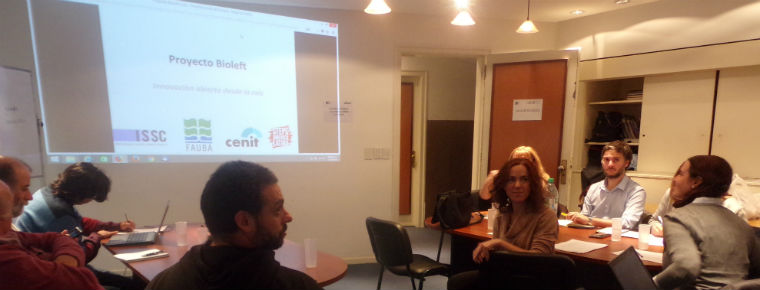On May 17, Centro de Investigaciones para la Transformación (CENIT) and STEPS Latin America ran a second Transformation Lab (T-Lab) in Buenos Aires, Argentina, as part of the STEPS consortium Pathways to Sustainability project. We invited seed breeders and researchers from the National Institute of Agricultural Technology and the School of Agronomy at the University of Buenos Aires, among other institutions, to help co-design Bioleft: a solution to some of the challenges of intellectual property in relation to seed innovation.
Our focus was on how best to protect the unhindered circulation of seed germplasm for research and development, in a scenario where domestic seed intellectual property rules are likely to become more restrictive. The CENIT team presented a draft of Bioleft: a contract based on open source principles, as a tool to promote collaborative innovation.
Anabel Marin, the project coordinator, highlighted the importance of protecting seed genetic material from future exclusion, for example via the use of patents, in a scenario where the seed market is increasingly concentrated. “We want to be able to ensure the circulation of germplasm for research and development”, she said. Vanesa Lowenstein, an intellectual property specialist, outlined the legal characteristics of the “Bioleft clause”: a contract that ensures that once germplasm is registered as Bioleft, it can circulate unencumbered for scientific purposes and that any material derived from it will remain open in the same way. “Bioleft is viral”, emphasized one of the project researchers, Almendra Cremaschi.
Potential and challenges
During the second part of the workshop, three groups analyzed the potential and limitations of our draft Bioleft contract, from the perspectives of public seed breeding institutions, private companies and family farming. The teams agreed that Bioleft could be a valuable complement to existing intellectual property standards, and could help maintain agricultural biodiversity. They highlighted the potential of Bioleft for public sector seed R&D, noting that it could be of great benefit for supporting the production of less well-known seed varieties which, since they don’t have a commercial market (“yet”, was heard) receive little investment from biotechnology firms. Gustavo Schrauf, head of the Department of Genetics at the School of Agronomy at the University of Buenos Aires, pointed out that much remains to be known about the beneficial consequences of a Bioleft contract but “it’s a new pathway. We have to walk it.”
